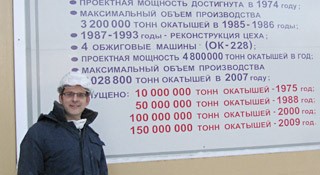'Benefiting both sides'
The best business trip of my life
Markus Szirmay is the Business Development Manager at Piller Industrieventilatoren GmbH.


With well-established business links in Europe, China and the US, the company is keen to grow and expand into new markets. Russia – a country of major strategic significance – is an increasing focus of interest for this SME from Moringen.
Gabriele Rzepka: Many German companies view the Russian market as promising but by no means straightforward. What prompted you to utilise the President’s Programme as a way of opening doors to business contacts in Russia?
Markus Szirmay: For me, the programme came as a real stroke of luck. I knew that I couldn’t develop the Russian market for my company unless I understood the mindset, culture, business practices, structures and customs of its industry and administration. You can attend as many seminars about Russia as you like – they don’t come close to conveying the reality. To understand the country and its people, you have to go there in person. The visit to Russia with the President’s Programme was the best business trip of my life.
The President’s Programme is the ideal entry point, and we are still in close contact with German and Russian participants via the German-Russian Management Network (DRMN) – with social, cultural and, of course, business activities.
You chose to visit Siberia. What made you opt for that particular region, and what impressed you most of all?
As you know, there’s Moscow, European Russia and Siberia. The country is incredibly diverse, and you can get to Moscow and St Petersburg reasonably easily. Siberia, however, with its strong steel, oil and chemical sectors, is not only far away; it is in fact a ‘modern’ adventure. Its industry is also very interesting for us, as it is where our potential customers are based.
What I never expected was the warm-heartedness and tremendous hospitality of the people; they really did treat us very well and make us feel right at home. The local organisation did everything they could to make our business trip as worthwhile and pleasant as possible.
I visited a small refinery in the Kemerovo region, around 140 kilometres away. The managing director, the deputy director and the marketing assistant picked me up in person and showed me around. I was genuinely touched by their warmth. Just imagine what would happen if roles were reversed and Russian managers were visiting Germany. Would they too be picked up by a German managing director, if the drive took over two hours?
As a businessman, you could try and form your own contacts in the Russian market. What makes the President’s Programme so special from your perspective?
The first major obstacle is the language. You need someone who speaks Russian. But a far more important aspect is that the President’s Programme has political support, in this case from the regional administration. That was the only reason why I was able to gain access to senior management in companies, administrations and institutions. That would have been quite impossible if I’d struggled along on my own.
It’s now two years since you first visited Russia with the President’s Programme. On balance, has it paid off for your company?
Two years ago, we were supplying goods to Russia on an occasional basis, but always via non-Russian plant construction or engineering companies. We had no direct contacts at all. Today, I’ve established links with companies and provincial governments. Enquiries are coming in thick and fast, and I’m confident that we will get our first direct contract from Russia within the first quarter of 2013. That’s a major achievement: there are companies that have had a local presence in Russia for four years without securing a single contract.
Based on your experience of Russia, what advice would you give to other companies?
In Russia, personal contacts count. Behind every business transaction, there are real people, and you have to understand them. Russia has a different way of doing business. It takes a lot of patience. It can take years to progress from the initial idea to the signing of the contract, but it is definitely worth being persistent when the going gets tough. The President’s Programme is the ideal entry point, and we are still in close contact with German and Russian participants via the German-Russian Management Network (DRMN) – with social, cultural and, of course, business activities. It’s a solid foundation for good long-term German-Russian relations.
At this point in time revitalising these relationships is essential. For this to happen, Igor Jurgens, head of Moscow’s Institute of Modern Development, believes civil society must get actively involved. This is why the President’s Programme and the work of the DRMN are more important than ever.
The interview was conducted by Gabriele Rzepka.
She is a freelance journalist, specialising in development policy and technology.